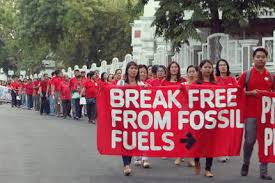By IDOWU, Odunayo
The industrial revolution the world witnessed decades ago though desired and planned was not spontaneously conceived. It was achieved by diligent and persistent exploration of the earth in a bid to discover newer sources of energy that would surpass the water, wood and peat in terms of robust generation of power. The fossil fuels discovered by these efforts were that and more.
According to Science Daily, fossil fuels are primarily coal, crude oil and natural gas. They are formed from the effect of heat and pressure on organic materials derived from decayed plants and animals in the earth’s crust over a long period of time. They have been a renowned source of energy worldwide since their discovery.
In Nigeria, crude oil is a major source of revenue for the country and its refined products are the major sources of energy for the industries and citizens. Its exploration areas are mainly in communities located in the Southern part of the country. Since the discovery of crude oil, the environments in this region have deteriorated because of oil spillage into water bodies and farmlands as result of exploration and vandalism. Though a region generating majority of the foreign exchange earnings of the country, the damage to the environment has been poorly addressed and managed. The wealth from crude oil sales was well anticipated and prepared for but not the danger to the health and safety of citizens residing in the explored and exploited communities. In spite of the massive sales of crude oil before the tables turned, Nigeria is still not the richest country in the world and the health indices have also not improved as expected.
In the midst of these issues, climate experts say the world is getting hotter by the day – a concept termed global warming. Global warming is the increase in the earth’s surface temperature as a result of greenhouse gases (GHGs). Greenhouse gases include water vapour, carbon dioxide, methane, nitrous oxide, chlorofluorocarbons, hydrofluorocarbons, perfluorocarbons and sulphur hexafluoride. The latter four are synthetic GHGs. Greenhouse gases are the dividends of the industrial revolution alongside the comfort and wealth it brought. Our dependence on fossil fuels has increased the emissions of these gases.
According to the World Bank, 94% of the Nigerian population is exposed to air pollution levels. This is not surprising because the economy is highly dependent on the use of fossil fuels. In Lagos state, the population of about 21 million is exposed to smog daily because of the high level of urbanization and industrialization. In spite of this, there is little monitoring of pollution and
 inventories of emissions are not available in the country.
inventories of emissions are not available in the country.
According to Nigerian Environmental Study/Action team (NEST), the impacts of climate change include extreme rainfall patterns, flooding, sea incursion, population displacement, increased drought in the northern parts of the country, and accelerated sea level rise in coastal regions. The climate experts also warn that climate change may pose the biggest health risk of the 21st century and that the maintenance of public infrastructure will be hampered if the resources earmarked are diverted to disaster recovery. Nigeria is said to have little contribution to the global greenhouse gases emissions yet the disasters of climate change have started unfolding. I was in my second year in University of Ibadan in 2012 when the worst flooding hit Oyo state. A friend of mine living off campus lost all her belongings and some lives were lost too. The WHO reports of that flood was that 23 states were affected, 363 people died, 18,282 people were injured, 2.1 million people were displaced and 7.7 million people were affected in other ways. Other consequences of flooding include displacement of waste by flood water causing propagation of infectious diseases as result of contamination of food and water. The flood water also contaminates water bodies and cause decreased access to potable water.
Just like other disasters that can occur as a result of climate change, flooding is worsened by poor urban planning and poor waste management. According to the 2015 WHO climate and health country profile, Nigeria has adopted certain measures to prevent the occurrence of another devastating disaster and these include creation of awareness about climate change and its impact, preparedness for emergencies and disasters, improved disease surveillance system and collaboration between ministries involved to provide climate information, potable water supply, proper nutrition, safe sanitation, immunization and elimination of poverty. But in a country where documentation rather implementation is celebrated, where maternal and child mortality is very high, where industrial actions are embarked on regularly because dialogues do not bring lasting resolutions, where corruption is perpetuated effortlessly by the leaders, where fuel scarcity is rife and where masses are the ones to bear the consequences of the actions and inactions of the government, it is unlikely that climate change will get the attention it deserves.
Just as climate change issues have been short-changed, actions embarked on globally to break free from the use of fossil fuels have been swept under the carpet in Nigeria. Even though the price of oil barrels has drastically reduced in the international market, the government still depends on it for the running of the economy because the other sectors may not be able to sustain the economy without earnings from crude oil sales. This is so not because these sectors are incompetent but because the government had a long time neglected Agriculture the first love of the economy which is struggling to regain its ability to generate sufficient revenue for the nation. In spite of all these matters arising, we must break free from the shackles of slavery crude oil has placed on us. Just as we have failed in refining our discovered natural resources, our approach to the health status of the country has remained crude. Now is the time to BREAK FREE.
As the ability of the fossil fuels to sustain us and the wealth they generate reduce, we need to embrace the use of cleaner and cheaper sources of energy while stabilizing other sectors of the economy especially Agriculture our pride. The rate of use of solar inverters has increased in recent times as fossil fuel availability has become unreliable. Generation of energy from waste products are also a way to properly manage waste and reduce the rate of pollution as a result of indiscriminate refuse burning. Policies should be made to check the release of harmful substances into the environment by industries and use of filters which reduce the harmful component of gases released into the atmosphere. The government should improve its transport facilities by use of less air polluting transport systems. Automobiles to be imported into the nation should be thoroughly inspected and certified to have functional exhaust systems. The sale of adulterated fossil fuels and illegal exploration of oil should be discouraged and punishable by law. Policies should be enforced that ensure that oil exploration companies cause minimal damage to the environment of communities where they have explored oil and should be made to partner with the government to provide sustainable basic amenities for the persons of these communities beyond giving them stipends. The government should empower the ministry of environment with manpower and other resources need to prevent the environment from further degradation and progressive reduced ability to sustain human life. The government should fight corruption in all tiers and ensure allocations of revenue to sectors are audited to ensure that they are used for the right purpose. The government should decentralize the economy by investing revenue in other sectors such as Agriculture which will stall the rate of deforestation, restore the carbon cycle, ensure food security, use of waste matter as manure for crop production, reduce the concentration of carbon dioxide caused by deforestation and forestall the imminent damage from climate change in the country.
When the above measures and policies are in place, the revenue generated by the nation can be more effectively used in pursuit of improved health indices rather than disaster management. Now that we know, let us strive to free – not from our colonial masters this time but from the bondage of fossil fuels we have entrapped ourselves in.
IDOWU Odunayo M. is a 600 level Medicine and Surgery student, University of Ibadan. Being an article published for the Climate Tracker Break Free Campaign.



